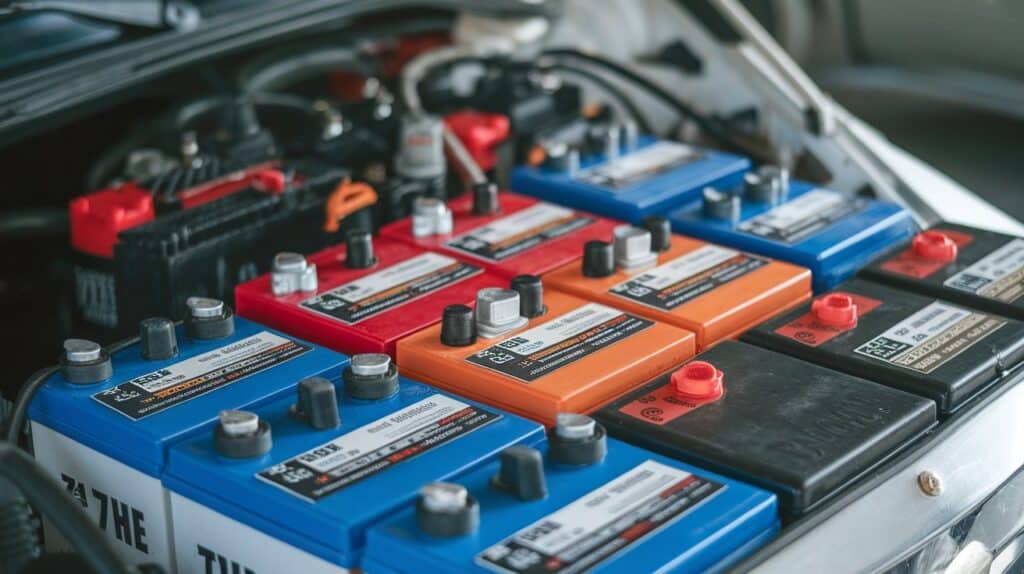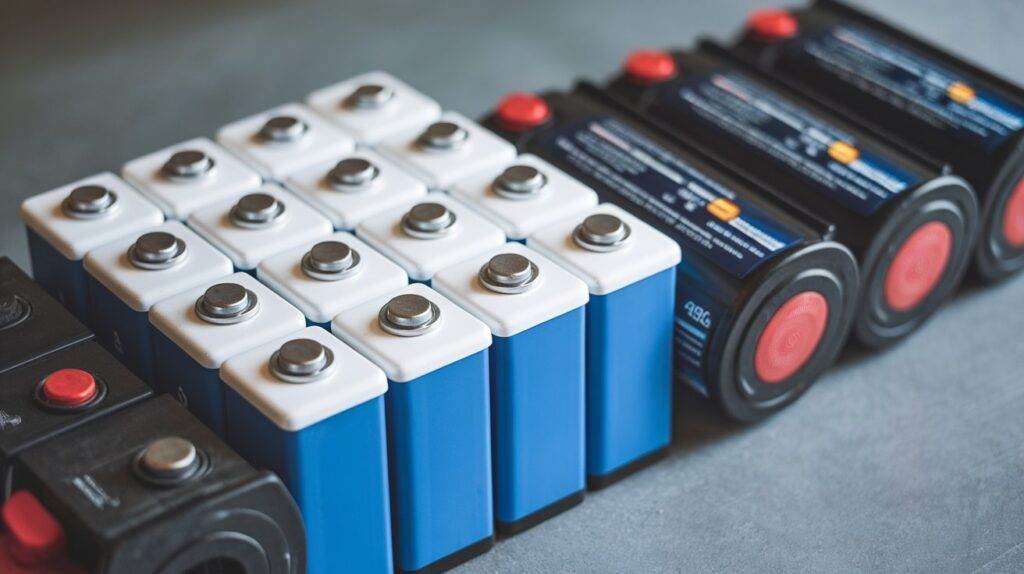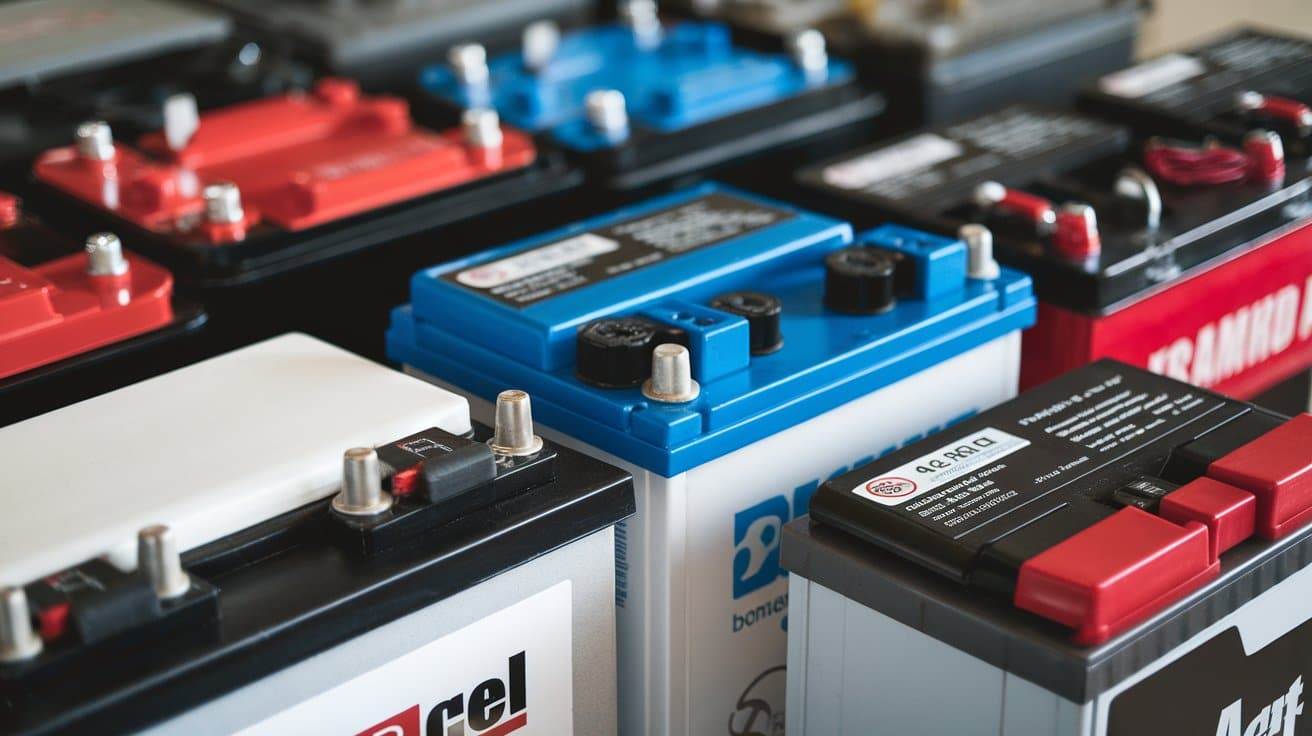Explore the various types of 12-volt batteries, including lead-acid, lithium-ion, AGM, and gel batteries, to find the best option for your energy storage needs. Compare different 12V battery types in terms of performance, lifespan, and efficiency.
What is a 12V Battery?
Understanding the Basics
A 12V battery is a battery that works at a voltage of 12 volts. This kind of battery is used in many places, like cars and energy storage systems. There are different types of 12V batteries, such as lead-acid and lithium-ion. Each type has its own features that affect how well it performs for different jobs.
So, how does a 12V battery work? It relies on chemical reactions between the electrolyte and the electrodes. For example, in lead-acid batteries, sulfuric acid is the electrolyte, while lead plates act as electrodes. This reaction is key to how energy gets stored and released when charging or discharging.
Common Applications
Automotive Uses
One big use for 12V batteries is in vehicles. They give power to start engines and run things like lights and radios. These batteries can deliver high cold cranking amps, making them great for starting engines even in cold weather.
Energy Storage Systems
Many homeowners use 12V batteries in energy storage systems to save extra electricity from solar panels or other renewable sources. This means they can use energy more efficiently when they need it most.
Recreational Vehicles and Marine Use
In RVs (recreational vehicles) and boats, having reliable power is super important for running appliances and navigation tools. That’s why special deep-cycle versions of these batteries are often used—they can handle long periods of discharge without getting damaged.
Importance of 12V Batteries
Key Benefits
Using a standard voltage like 12 volts means that many devices can work together easily. Plus, modern options often last longer and require less maintenance, which makes life easier for everyone.
Typical Lifespan and Maintenance Needs
Typically, a lead-acid battery lasts about three to five years if you take care of it properly. On the other hand, lithium-ion batteries can last much longer because they need less frequent upkeep compared to traditional types. Regular checks—like monitoring water levels in lead-acid batteries—can help extend their lifespan.
In short, knowing what a 12V battery is and how it works helps us see why it’s so important in many areas—from powering cars to supporting renewable energy setups. With benefits like compatibility and longevity, these batteries play an essential role in our daily lives.
Factors to Consider When Choosing a 12V Battery
Intended Application
When picking a 12V battery, knowing what you’ll use it for is super important. Different uses need different types of batteries to work well. For example, if you need a battery for vehicle use, like in cars, those batteries are made to give high cranking amps. This helps start engines really fast.
If you’re thinking about recreational applications, like RVs or boats, you’ll want deep cycle batteries. These can handle being drained and recharged many times without getting hurt. They’re great for long trips or days out on the water. Also, home energy storage systems work better with batteries that can handle solar power well. Picking the right battery based on your power needs and system requirements makes a big difference in how well everything works.
Budget
Your budget matters when choosing a 12V battery too. You should think about cost versus performance carefully. Lead-acid batteries might be cheaper at first but often cost more to maintain and don’t last as long as lithium-ion ones.
So, consider both the initial investment and any long-term savings before making your choice. Lithium-ion batteries usually give better efficiency and last longer, which could save you money over time even if they cost more upfront. Figuring out the value of each type of battery helps you make a smart decision.
Maintenance Preferences
Think about how much maintenance you want to do when choosing your 12V battery type. If low maintenance sounds good to you, sealed lead-acid (VRLA) or lithium-ion batteries are good options since they don’t need much care.
On the flip side, traditional lead-acid batteries often require regular checking of water levels and electrolyte balance—so they can be more of a hassle. Knowing how much time and effort you’re willing to spend on maintenance will help you pick the right battery for your needs.
Environmental Impact
The environmental impact of different battery types is becoming more important these days. Lithium-ion batteries usually have a smaller carbon footprint than traditional lead-acid ones because they last longer and work better.
But don’t forget about recycling! It’s important to look into recycling options for all types of batteries since throwing them away wrong can cause hazardous waste problems. Researching eco-friendliness across battery types helps you make responsible choices while still getting good performance from your applications.

Challenges For All Lead-Acid Battery Types
Lead-acid batteries are commonly used in many areas, but they come with some challenges that users should know about. One big issue is their weight and size. Compared to newer types like lithium-ion batteries, lead-acid batteries are heavier and bulkier. This can be a problem in places where space and weight matter, such as electric vehicles or portable energy systems.
Another challenge is the lifespan of lead-acid batteries. They can last several years if taken care of properly, but they usually don’t last as long as lithium-ion options. Users need to pay attention to maintenance practices to keep their performance up over time.
Maintenance Requirements
Taking care of lead-acid batteries means regularly checking water levels and electrolyte conditions. Users should look at these things often to avoid damage and extend battery life. It’s important to make sure the sulfuric acid solution stays at the right level for good chemical reactions inside the battery.
If maintenance is ignored, it can hurt performance a lot. For example, neglecting these checks may lead to sulfation—where lead sulfate crystals build up on the plates—resulting in less capacity and efficiency.
Safety Concerns
Safety is a major concern when dealing with lead-acid batteries because of risks like acid leaks and spills. Proper handling during installation and transportation is very important. Also, following safe storage practices helps reduce risks; this means keeping batteries upright in a well-ventilated area away from anything flammable.
To stay safe while using lead-acid batteries:
- Always wear protective gear.
- Make sure terminals are clean and free from corrosion.
- Keep a spill kit handy just in case something goes wrong.
By following these safety tips, users can lower risks while enjoying the benefits of their lead-acid battery systems.
Tips for Extending 12V Battery Life
To get the most out of your 12V batteries—whether they’re lead-acid or lithium-ion—it’s key to follow best practices. Regular charging and discharging cycles help keep them healthy by avoiding deep discharges that shorten lifespan.
Preventing overcharging is also super important; using smart chargers with charge controllers helps manage voltage levels correctly. These devices stop too much current from flowing, which could harm your battery over time.
Storage Recommendations
For storing your batteries:
- Keep them in a cool place away from direct sunlight.
- If you won’t use them for a while (like with RVs), think about disconnecting the battery during long breaks.
- Make sure temperatures stay within recommended ranges for both charging and discharging activities.
Routine Checks and Inspections
Doing routine checks on your 12V batteries is crucial for spotting problems before they become costly repairs or replacements. Watch out for signs like:
- Corrosion around terminals
- Swelling or bulging
- Poor performance during use
Regular inspections help catch issues early on—making sure your energy systems are reliable whenever you need them!

How to Choose the Best 12V Battery Type For You
Evaluating Personal Requirements
When picking a 12V battery, think about what you really need based on your specific use case scenarios. Different situations require different types of batteries. Here are some common examples:
- Automotive Applications: If you’re just starting your car, a flooded lead-acid battery is often enough. They are reliable and cost-effective for this purpose.
- Recreational Vehicles (RVs): For RVs that need deep cycling capabilities, lithium-ion batteries like LiFePO4 variants work best. They last longer and are more efficient than traditional lead-acid batteries.
- Marine Use: Boats require batteries that can handle deep cycles and tough conditions. Lithium-ion options shine here due to their durability.
- Energy Storage Systems: If you’re using solar energy, lithium-ion batteries are great for their long life and efficiency.
Performing cost analysis can help you find the best fit for your budget while meeting your needs effectively.
Expert Recommendations
Getting advice from industry professionals can really help you make a good choice. Experts often share insights based on years of experience with different battery types. Customer reviews also give real-life feedback about various brands and technologies.
For instance, many users have shared positive experiences with Battle Born Batteries because they perform well in extreme conditions and have a long lifespan. This kind of feedback is valuable as it helps you make an informed decision that suits your needs.
Innovations in Lithium-Ion Batteries
Recent improvements in lithium-ion technology have led to better lifespan and efficiency for these batteries. Manufacturers are using new materials that boost energy density while making them lighter. This is especially helpful when space is tight but power demands are high.
Better manufacturing techniques allow companies to produce more reliable cells at lower costs, giving consumers better value without losing quality or performance.
Future Developments
Looking ahead at future developments in 12V battery technology shows exciting trends like smart features such as Battery Management Systems (BMS). These systems check the health status of the battery and adjust charging cycles automatically, making things easier for users.
Upcoming models might offer even higher capacities while staying compact enough for various uses like electric vehicles (EVs) and renewable energy systems. As the world looks for greener energy solutions, we can expect innovations focused on eco-friendly materials and recycling processes that reduce environmental impact while improving overall efficiency across all types of 12V batteries.
In this section, we will recap the key points discussed throughout the content. Understanding the different types of 12V batteries is important for making smart decisions about energy needs. The main categories include lead-acid and lithium-ion batteries. Lead-acid variants like flooded and sealed valve-regulated (VRLA) have specific advantages in terms of cost and availability but require maintenance. On the other hand, lithium-ion options such as LiFePO4 offer longer lifespans and efficiency but often need a higher initial investment.
Final Thoughts and Recommendations
When choosing a 12V battery type for your application—whether it’s for automotive systems or renewable energy solutions—think about what you specifically need. Look at factors like battery performance versus cost and your maintenance preferences to find what fits best for you. If you value longevity and efficiency more than initial costs, investing in lithium-ion technology might be a good idea.
To deepen your understanding of 12V battery systems and their applications in various fields—from automotive to solar energy—check out additional resources available online. If you want expert advice tailored to your unique requirements or wish to join a community focused on electrical systems and lithium technologies, feel free to reach out.

